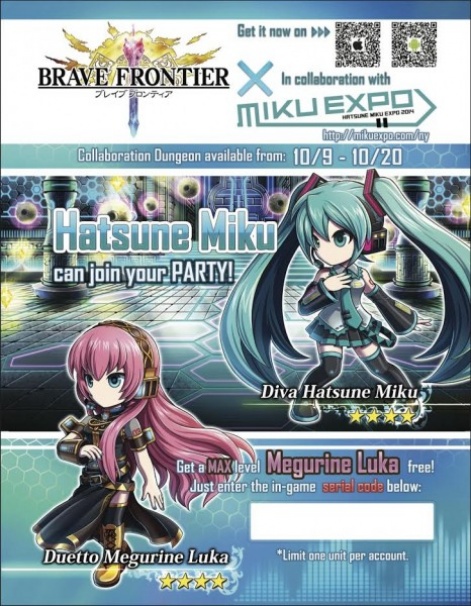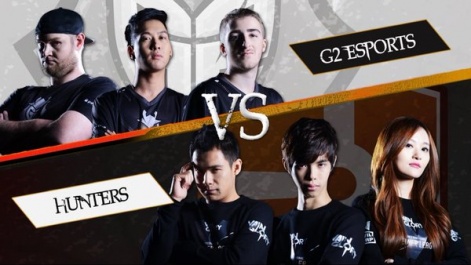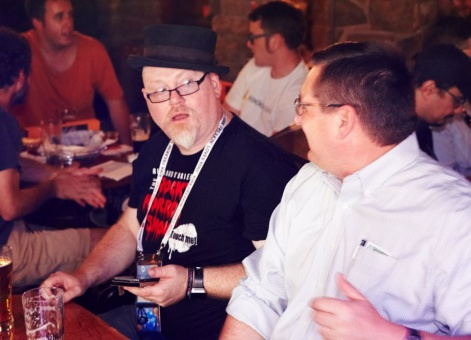It's already been largely agreed in a previous Mobile Mavens discussion that E3 is too entrenched in the console retail space to be of true utility to the mobile games industry.
But with Gamescom fast approaching, and its biggest year for mobile gaming ever lined up for 2016, does it represent the blueprint for all forward-looking conferences to follow? We asked our Mobile Mavens:
- Is having trade shows embedded within consumer events - e.g. Gamescom and ChinaJoy - a better fit for mobile games than the retail-focused E3?
If you can find a lot of Pokemon, then I guess mixing consumers with these conferences makes a lot of sense. Other than that, I'm not sure consumers visit these events for mobile.
All entertainment is driven by word-of-mouth, but mobile especially so. Mobile is also a post-launch market, as mobile consumers by-and-large do not care to do purchase research.
Putting a mobile gaming trade show in a consumer-facing game event would be about as useful as putting urinals in the ladies' bathroom.

Nick Malaperiman has launched Console, PC or Mobile games since '95. Nick first started at EA, launching multiple FIFA, NBA and NHL franchises, during 7 years. Nick then started Nokia's Games marketing division, launching 300+ games/apps in 7 years. Nick was previously GM of Yummi Games, in China and Founder of Chunky Pig Marketing - now part of Roadhouse Interactive.
I'm cynical that trade shows really benefit the trade they purport to support. I'd be interested to see how much new business is truly generated at trade shows.
They're dominated by mobile ad networks and third-party 'service as a service' suppliers, and if games companies really want to talk to each other, they pick up the phone and don't wait for the trade shows.
So, when it comes to consumers and trade shows; let the minions in. They'll still be drawn to the big budget, high-profile booths and stands, to support the maintenance of the "build it, and they will come" hypothesis.
Scott, I'll raise your urinals analogy, and suggest that trade shows are for the minions, and as useful as an ashtray on a motorbike for the trade.
Disclaimer - I continue to attend, always will attend, the Pocket Gamer Connects events.
Trade shows embedded with consumer-facing events is the future for all B2C markets.
I found that consumers are hungry for video game-related experiences. Midnight releases, console launches, game related merchandise, and consumer related shows are huge business!
Finding one person that wants to use their personal brand to talk about your game is as important as the game itself.Jared Steffes
The first time I went to Tokyo Game Show was in 2009 on the public day. It was absolutely packed with some of the longest lines I've ever seen people stand in.
People want to live games and want to talk about games (word of mouth, that ever important K-factor).
My first day at Tokyo Game Show along with entering E3 as a member of the press changed me forever. We are in a business of nearly unlimited content (in regards to the amount of releases everyday, existing content being re-re-released, and the internet never forgetting).
Finding that one person that wants to use their personal brand to talk about your game is as important as the game itself.
I stopped focusing on making games to work on the opportunity of consumer-focused gaming experiences. It is called Hypecade.com.
Developers are attending shows like PAX, spending thousands of dollars for a small kiosk, and not having people play their games.
They have no clue what their ROI is and are left with a bad experience. The core recipe of success is the secret sauce of what I've been working on.
At the end of the day, we all want influencers everywhere playing our games and talking about them.
YouTube and Twitch are the current hot ticket for marketing, but the lack of genuineness is already having a negative effect on gamers/viewers.
For example, see the Warner Bros and CounterStrike: Global Offensive betting debacle which led to enforcement of existing and new laws requiring an internet personality to disclose relationships.

Oscar Clark has been a pioneer in online, mobile, and console social games services since 1998. He is also author of the book, Games As A Service – How Free To Play Design Can Make Better Games.
Oddly, I'm in the confusing position of partially agreeing with both Scott and Jared.
Scott is right that currently, consumer shows are pointless for mobile - it's all about post-access marketing (virality and in-game ads). We haven't quite created a culture of endorsement/fandom which really drive the PC/console market.
The friction-less digital distribution of mobile games is phenomenal and won't be replaced by a consumer show.
However, as Jared correctly points out, the showmanship present in midnight releases is important.
That kind of spectacle, along with cosplay communities and the chance to meet the endorsers (YouTubers and Twitchers), is what seems to me the be underlying the success of consumer shows like Comic Con and Insomnia.
People attend to feel part of the community and express themselves whilst discovering upcoming cool stuff.
The trouble for me with E3 (and why I've not been in nine years) is that its focus remains rooted in the physical distribution discussions between publishers and retailers.
Yes, E3 is arguably broader than that now; but it didn't grow out of how players access your game now or why they keep playing it.
Gamescom seems to have captured a little bit of that spark - which is why I still love it and I always take some time before I leave on Friday to walk the show floor, see the cosplay and experience the heaving mass of fans.
Even with the huge numbers (and how that multiplies through social media sharing) there remains a problem with scale.
Sure there may be over 120,000 people attending London MCM Comic Con - but that's the tiniest fraction of the audience it takes to be able to build a success in mobile. But that doesn't mean its not valuable.
I think it's essential for us in the trade to attend consumer shows.Oscar Clark
In fact, it can be turned into an advantage. It's a great occasion to show off your game to new players who have no emotional attachment to you (which is hugely valuable) and its a fantastic chance for your most devoted fans to come and meet you.
However, how many mobile games currently have the kind of audience who will cosplay and get excited about meeting the developers? Evidently, we aren't there yet.
But its just a matter of time. Comic and science-fiction conventions never used to be as 'cool' (or mass market) 20 years ago when I first went to show off my early tabletop games.
Oh, and one last thing! Trade shows benefit from being alongside consumer shows creating a critical mass of developers, publishers and service providers in one place. I also think its essential for us in the trade to attend consumer shows.
It was really refreshing for me to attend Insomnia (where, rightly, no-one knows or cares who I am) and meeting people like Dan Middleton (Youtuber Dan TDM) who was great to talk to even though he was surrounded by crowds of fans - it reminded me that games are about entertainment first and foremost.
I agree with Oscar: while consumer shows currently don't help build up expectations before a mobile game release, they can certainly attract fans of an existing live game and help nurture an online community through some form of physical presence.
Blizzard and Riot are taking this logic to the extreme by organising their own conferences and events.
When I was at Gumi, piggybacking other consumer shows in Japan, the US and Europe was an important part of our marketing and community management strategy for Brave Frontier and other games.

We'd have fans come in full cosplay meet both the live team and the game creators. I also feel consumer shows can definitely take great advantage of the big trend towards video broadcasting, either by inviting influencers or organising game tournaments.
E3 is a different beast in itself: it's not a game conference with business booths, yet while it has all the appearances of a consumer show it's restricted to the press.
For mobile games, I fail to see the interest in the current format.
I agree with the majority on this one: consumer facing shows are not very important for mobile games.
It comes down to two things:
Firstly, as pointed out, mobile does not have the huge pre-launch hype cycle that attracts fans and cosplay people. This is due to the nature of F2P.
There is not a long hype period between knowing for sure that a game will launch, and actually launching it.Torulf Jernström
There is not a long hype period between knowing for sure that a game will launch, and actually launching it. A lot higher percentage of games are killed during production among mobile F2P.
We only know for sure that a game will go to global launch once it shows really good numbers in soft launch. And then, there's no point in waiting half a year and building hype anymore. Just launch.
Contrast that with big console titles. The studios have a pretty good confidence that they will actually launch, and that they have six or 12 months left of development time until they do. And it's all about the pre-launch hype.
Secondly, the numbers: on mobile you will need high tens of thousands up to hundreds of thousands of downloads per day to break through and rise to the visible positions on the charts.
Even the largest events are "only" attended by hundreds of thousands of people. Meaning that you need to get above 10% of them to download your game on a single day before you get a significant boost from that to your charting position. Pretty much impossible.
What might make sense is having the very top mobile games using these events to connect to their superfans. But you need superfans already before the event to make that work.

John is co-founder of PR and marketing company Big Ideas Machine. Also an all-round nice guy...
eSports is what's changing this dynamic. As a genre, it has a large audience of superfans, and the games need the hype machinery of brand-led marketing to keep the fanbase engaged.
These games also have the budgets and commercial clout to create events, leagues and prize funds that make it a very different beast to conventional mobile games.
Vainglory may be getting lots of attention due to the pedigree of the product and the team behind it, but I see Asia as where the real mobile esports push is coming from, with a variety of games already with hundreds of thousands of players, and prize funds in the millions.

These games will create their own events and social media communities that exist way beyond a trade show format.
These will continue as a way for developers (and YouTubers and Twitch streamers) who have already built a community of fans to meet them face to face, in the way that EGX does so well.
Pretty much none of this is relevant to 99% of mobile F2P games, that rely on ads to drive installs. Torulf is right that only games already at the top have the superfans to make tradeshows worthwhile, and even then it's just vanity marketing.
Which I'm all for!
[people id="11" name="Brian Baglow]
Absolutely agree with all of the comments to date.
I think it's important to note that there's a real movement towards a far more grass-roots and local level of event, from Let's Play parties, to indie game showcases, where smaller studios and indies (including a large percentage of mobile developers) can get together, demo games and network.
More and more mobile companies are choosing the 'indie' approach to events, expos and festivals.Brian Baglow
We're seeing this across the whole of the UK and it's usually a communal effort, or at the very least, organised by a regional group.
The costs are far lower (typically free) and it covers the local industry, players - and whatever local media there is.
So for a lot of studios this has become a far more relevant and enjoyable way to market and to get their game in front of real players - without the international travel and costs of the major shows, and the fact they tend to be stuck in some god-forsaken corner or basement.
Some studios do move onto the larger events, but more and more studios seem to prefer to move between the regional events and widen their contacts and audience that way.
I know this is a significant step down from the major mobile studios and chart-toppers, but more and more mobile companies are choosing the 'indie' approach to events, expos and festivals.
[/people]
[Update: Mobile Mavens' post-Gamescom reflections below.]
Now that Gamescom is all over and done with, we asked our Mobile Mavens:
- What were your personal and professional highlights at Gamescom 2016?
This year's Gamescom was all about VR. That’s the big topic. Mobile is and always will be a niche market on such consumer exhibitions.

Oscar Clark has been a pioneer in online, mobile, and console social games services since 1998. He is also author of the book, Games As A Service – How Free To Play Design Can Make Better Games.
Was that Gamescom? It flew by so quickly I felt like my feet hardly touched the ground.
For me, it's about the whole week with Respawn, GDC Europe and Gamescom back to back and filled with events like the Big Indie Pitch and spaces like the Indie Megabooth.

There is just too much to see and too many people to meet. But I love it!
Sadly, I failed to get all the way round on the public days (I think that it's important we endure what our players have to endure) but I couldn't turn down that one last meeting.
It's an incredible week and with amazing weather and superb networking events - what a rush!
And okay, from a consumer show perspective we haven't moved the needle as a mobile industry; but there are pockets out there.

Sports and Action Sports games related with Brands have been his mantra, having worked at Biodroid for 7 years he had the opportunity to develop Skate, BMX, Surf, Olympics and football games.
Early in 2015, he started his own Studio, B5 Studios, a real mix approach to game dev from truly indie games to physical/hardware interaction experiences that combine mobile with external interfaces because games are made to make people happy.
What can I say, I was there the full week: Respawn, GDC Europe and Gamescom biz days and public days.
It was our first time showcasing a game at the Indie Arena booth and it was an amazing experience for all the team.
Gamescom had many mobile VR games and experiences showcasing on booths.Ricardo Flores
It's a crazy week full of really concentrated action from biz dev to getting feedback on our games directly from the players.
Mobile-wise, Gamescom had many mobile VR games and experiences showcasing on booths.
Whether consumers will buy it and play it at home its another question, but it was good to see people queuing to experiment with these new VR games.
Traditional mobile games are almost absent from the consumer show floor and the ones that are on the floor also have web / PC versions.
From an indie perspective, and having been in the Indie Arena, mobile was there with a few innovative games and there were always people playing them - they manage to compete in attention and air time with PC and console games.





























